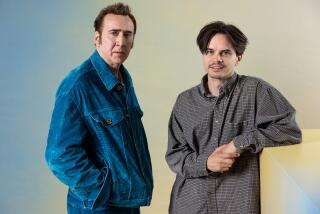‘Bruno’ doesn’t help gays
- Share via
It’s not that we don’t get it. The makers of the film “Bruno,” Sacha Baron Cohen’s just-released follow-up to “Borat,” have said that they intend to satirize and expose homophobia. But even when filmmakers have the best of intentions, there can be a disconnect between the concept and the execution. In “Bruno,” the satire often loses sight of the way gay people are treated in real life.
Consider a different movie, “I Love You, Man,” in which Paul Rudd’s character, Peter, deflects a pass from another man. Peter handles the situation with grace, modeling how an adult would and should react to crossed signals. But the audience in the theater often had a very loud and very different reaction: “Ewwwww.”
I’ve seen a rough cut and the final cut of “Bruno.” If some people get icked out over an innocent kiss, imagine the reactions to a movie that is loaded with stereotypes, toilet humor and a steady stream of gross-out gags. Yes, some of this is aimed at mocking anti-gay attitudes -- and the film often hits its mark. But far too much of it, intentionally or not, ends up hitting gay people instead.
In some scenes, the film’s method cleverly skewers anti-gay attitudes. But in others it loses its way. In the film’s finale, a disguised Bruno takes part in a no-holds-barred cage match in Arkansas (a state that in November voted to effectively ban gay people from becoming adoptive or foster parents). The situation is a set-up, and in the middle of the fight, Bruno begins to rip the clothes off his opponent and kiss him. The audience for the cage match, which is not in on the joke, goes berserk, screaming epithets and hurling objects -- including a chair -- at the two men. (The film’s production notes say that the confrontation “lasted many hours” and required 40 police officers “to rescue the cast and crew and quell the angry mob.”)
Whatever this scene may reveal, it is disturbing on a number of levels given the pervasive violence gay people often face. Late last year, the FBI reported that anti-gay hate crimes have been on the rise since 2005. Last month, the National Coalition of Anti-Violence Programs reported that violent hate crimes against gay, lesbian, bisexual and transgender people increased 24% in 2007 and additional 2% in 2008.
Another scene has Bruno on a TV talk show with a baby in tow. Intended to spoof celebrity adoptions, the scene suddenly veers to a photo of Bruno and the baby in a hot tub with a number of naked men, followed by a photo of what appears to be sexual activity between Bruno and the men in the background -- while the baby is still in the foreground of the photo. Naturally, the talk show audience turns against Bruno.
In too many places, scenes like these are not going to turn homophobia back on itself. They aren’t going to help gay people who are struggling to overcome and overturn the unjust treatment and the deeply ingrained hostility they face on a daily basis. And they aren’t going to help lesbian and gay parents in places like Arkansas who must struggle to safeguard their families in the face of laws designed to put them at risk.
I understand that films like “Bruno” are about confronting audiences with outrageousness. Manufacturing a sense of discomfort is often the point. And if you’re uncomfortable with what you’re seeing, that’s your problem and you’re just going to have to deal with it.
The issue with “Bruno” is that the majority of its (mostly straight) audience will have to “deal with it” for only 90 minutes or so. But it’s gay people -- day in and day out -- who will be stuck dealing with the fallout from a film that ultimately affirms some of the attitudes it believes it is trying to demolish.
It could come up in the form of jokes about gay parents at the office. Or gay teens taunted with the name “Bruno” in school hallways. Or in fanning the flames of anti-gay campaigns and laws, like California’s Proposition 8, pushed by those who exploit discomfort, and the “ewwww” factor, for political ends.
We live in a world where far too many still mistreat and abuse gay people, deny us the ability to take care of the ones we love and exclude us from fully participating in the life of our communities. For a major studio film with a massive cultural footprint to pile even more stereotypes and discomfort onto an already hostile climate -- despite what are inarguably the best of intentions -- doesn’t make the work of changing and overcoming it any easier.
More to Read
Only good movies
Get the Indie Focus newsletter, Mark Olsen's weekly guide to the world of cinema.
You may occasionally receive promotional content from the Los Angeles Times.









